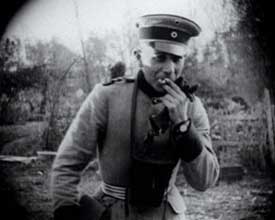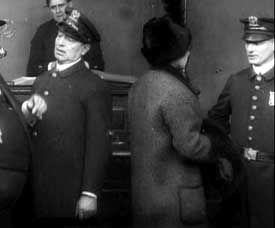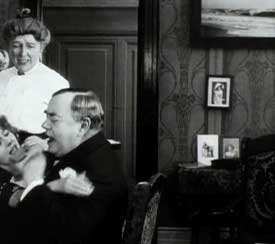 It's the evil Huns vs the good Belgians in The Unbeliever (1918), filmed at Quantico as a propoganda film to drum up war ferver against Germany, involving actual marines in the production.
It's the evil Huns vs the good Belgians in The Unbeliever (1918), filmed at Quantico as a propoganda film to drum up war ferver against Germany, involving actual marines in the production.
At eighty-five minutes, The Unbeliever is practically epic compared for the time. It was based on the novelette "The Three Things" by the frequently patriotic writer Mary Raymond Shipman Andrews, & directed by Alan Crosland, director also of the first sound film, The Jazz Singer (1927).
Many pro-war anti-German film were made at the time, but few with such realistic battlefield scenes like The Unbeliever. The tragedy of "collateral damage" as we call it today is of course strictly the fault of German officers, among whom Eric Von Stroheim is the stand-out as a maniac who delights in the torture of children.
The politics of the time justified the demonization of Germans, who would get worse & worse until the rise of the Nazis & their second national round of villainy, making Stroheim's seemingly exaggerated portrait of German soldier as psychopath appear after all understated.
Beyond the justified Teutonophobia of the time there's also a very fine theme of breaking down the class system, as our always-tidy American marine hero (Ray McKeep) was of the uppercrust, & only learns during the war that the lower classes are truly heroic & the salt of the earth, inferior to no one.
The additional theme of our hero finally embracing Christianity, for "on the battlefield, unbelief was wiped out," is less interesting because much more trite.
 Herr Muller (Frank A. Lyon) asks a passersby for directions & though slow to understand anyone, & they him, as he speaks only German.
Herr Muller (Frank A. Lyon) asks a passersby for directions & though slow to understand anyone, & they him, as he speaks only German.
He finally understands he's to get on a trolly that will connect to a crosstown line. A conductor on the trolly tells him just to follow a certain woman who has a transfer for the same crosstown line.
Everything that proceeds out of this beginning is All On Account of a Transfer: A Comedy (1913). The woman Her Muller is following realizes she has forty minutes before the transfer expires so decides to go shopping.
Muller is always nearby, no matter which way she goes, & she has no knowledge as to why. She thus develops a fear of his intentions. She reports him to a sales clerk & he believes people are conferring to help him while in fact they're all berating him as a stalker or a pervert.
The police haul him away before a judge & he still hasn't a clue what's going on. One of the cops figures it out correctly & explains to the judge why Muller was following her, & everyone finds it amusing. She decides to personally show him the way to his destination, & they become fast friends.
The story is mildly amusing, sweet but trivial. The character of Muller is effectively lost & vulnerable.
 Tom Perkins (Augustus Phillips) has been courting courting lovely young Muriel Jackson (Gertrude McCoy), but he's not a man of particular means, & her parents reject him as a valid suitor.
Tom Perkins (Augustus Phillips) has been courting courting lovely young Muriel Jackson (Gertrude McCoy), but he's not a man of particular means, & her parents reject him as a valid suitor.
Thus begins Serenade by Proxy (1913). Muriel is heartsick that Tom has been banished from further contact with her until such time as he can prove his worthiness.
The slatternly maid, called Romantic Molly (Alice Washburn), is addicted to romantic novels, but rejects the advances of a fellow servant, Zeb (William Wadsworth), requiring him to be more like a hero from a book.
Zeb seeks Muriel's intercession in his behalf, but Molly explains to Muriel how Zeb lacks a sufficiently romantic disposition. So Muriel tells Zeb he must serenade Molly that very night.
He sets up an Edison cylinder player in the night to do his serenading. This sort of product placement was typical of Edison films, & they even give a close-up of the cylinder Zeb has chosen, of the song "Love Me, & the World is Mine." By this means a silent film is given a theme song which can fill the viewer's imagination even if there is no silent film pianist handy.
Molly & Muriel listen to the love song together with Muriel pitching to the servant how terribly romantic Zeb is being. Zeb & Molly toss kisses to one another, & eager Molly nearly leaps headfirst from the second story window but that Muriel restrains her.
Next day Molly's so happy, & Zeb so proud & lucky as she wants to elope with him at once, to be forcefully swept away. Muriel helps her pack, & Zeb arrives that night through the window to whisk her away.
By coincidence Tom happens by & sees the ladder leading to the maid's room & assumes there's a thief. He attempts to intervene & in the confusion Muriel's father assumes it is Tom & Muriel who are eloping.
So they decide what they heck, they will, & ride away along with Molly & Zeb, straight to the minister's house for a double wedding & happy ending. And Tom never even had to prove he could support a wife.
Not a good film by any means, as the high point is the audacity of inserting such an overt commercial for Edison cylinder players.
copyright © by Paghat the Ratgirl
|



